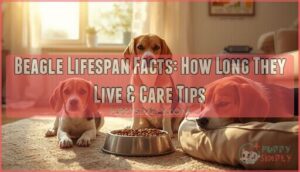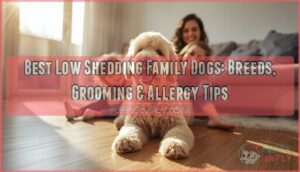This site is supported by our readers. We may earn a commission, at no cost to you, if you purchase through links.
Your Beagle’s soulful eyes and wagging tail bring joy to every day—but how many years will you actually get to share together? Most Beagles live between 12 and 15 years, though some beat the odds and celebrate their 16th or even 17th birthday.
The difference between a Beagle who barely reaches 10 and one who thrives well into their teens often comes down to factors you control. Genetics load the gun, but lifestyle pulls the trigger.
From the food in their bowl to the weight on their frame, your daily choices shape whether your pup joins the senior Beagle club or faces health challenges that cut their time short. Understanding what actually impacts your Beagle’s lifespan—and what’s just noise—gives you the power to add quality years to your best friend’s life.
Table Of Contents
- Key Takeaways
- Beagle Lifespan: What to Expect
- Genetics and Beagle Longevity
- Key Factors Affecting Beagle Lifespan
- Common Health Problems in Beagles
- Tips to Help Your Beagle Live Longer
- Frequently Asked Questions (FAQs)
- What factors contribute to the variation in a beagle’s lifespan?
- How does the average lifespan of a beagle compare to other breeds?
- What are the most common causes of death in beagles, and how can they be prevented?
- Is there a correlation between a beagle’s size and its lifespan?
- How does neutering or spaying affect a beagle’s lifespan?
- What are the signs of aging in Beagles?
- Can spaying or neutering affect Beagle lifespan?
- How does stress impact a Beagles longevity?
- Do Beagles from shelters live shorter lives?
- What supplements can help extend Beagle lifespan?
- Conclusion
Key Takeaways
- Most Beagles live 12-15 years, but your daily choices—like managing their weight, feeding quality food, and scheduling regular vet visits—matter more than genetics in determining whether your pup reaches their senior years or faces early health problems.
- Preventable conditions like obesity, ear infections, and hip dysplasia cut Beagle lifespans short, yet simple habits like proper portion control, weekly ear checks, and moderate exercise (60-90 minutes daily) can add years to your dog’s life.
- Genetic testing reveals inherited risks like epilepsy and progressive retinal atrophy before symptoms appear, giving you the power to catch problems early and work with your vet on proactive care that extends your Beagle’s healthy years.
- Spaying or neutering dramatically boosts longevity—neutered males live 18% longer on average—by eliminating deadly infections, reducing cancer risks, and preventing dangerous roaming behaviors that threaten your Beagle’s safety.
Beagle Lifespan: What to Expect
When you bring a Beagle into your life, you’re signing up for years of loyalty, adventure, and those soulful eyes that can convince you to share just one more treat.
Before you fall for that puppy face, it helps to know how big Beagles actually get so you can prepare the right space and care for their needs.
When you bring a Beagle home, you’re signing up for years of loyalty, adventure, and soulful eyes that make every treat worth sharing
Most Beagles live between 12 to 15 years, though some beat the odds with excellent care and a bit of good luck.
For a closer look at what influences their lifespan and what to expect as a Beagle owner, check out this guide to Beagles as pets, including cost and temperament.
Let’s break down what influences their lifespan and how your Beagle stacks up against other breeds.
Their compact build—typically ranging from 13 to 15 inches tall and 20 to 30 pounds—means Beagles avoid many joint and heart issues that shorten the lives of larger dogs.
Average Lifespan Range
Your Beagle’s lifespan usually ranges from 12 to 15 years – with many happy pups reaching their mid-teens! Population studies show most Beagles live around 12 to 14 years on average.
If you’re considering a Beagle as a working companion, understanding their temperament and trainability as service dogs can help you make the best choice.
Lifespan factors like genetics, early-life health, and weight management play huge roles in canine longevity and aging. Some long-living Beagles even surpass 15 years with proper care!
Comparison to Other Breeds
How does your Beagle stack up against other breeds?
Regarding canine longevity and aging, breed size impact matters! Here’s what the data shows:
- Small breed dog characteristics often mean longer lives – Jack Russell Terriers and Cocker Spaniels usually reach 13-16 years
- Genetic similarities place Beagles right in the sweet spot with comparable scent hounds (12-14 years)
- Average lifespan for medium hounds closely matches your Beagle’s life expectancy
- Long living Beagles can outlast larger breeds while smaller pups may edge ahead slightly
The good news? Health comparisons show Beagles hold their own beautifully! While lifespan variance exists across breeds, your pup’s longevity depends more on the care you provide than size alone. Crossbreed longevity can vary, but purebred Beagles benefit from predictable health patterns when you stay proactive.
Male Vs. Female Lifespan Differences
Does gender affect your Beagle’s lifespan? Research shows female Beagles often live slightly longer than males—though we’re talking months, not years!
The sex lifespan gap in Beagles is modest but real. Studies on canine longevity reveal hormonal differences and spay/neuter status play bigger roles than gender alone. Male health issues and female mortality rates vary, but your care practices matter most for Beagle life expectancy!
Genetics and Beagle Longevity
Your Beagle’s genes are like a blueprint that shapes everything from their personality to how many birthdays you’ll celebrate together. Some genetic factors work in your favor, while others require extra attention and care.
Let’s explore the specific ways genetics influence your Beagle’s longevity and what you can do about it.
Breed-Specific Genetic Factors
Your beagle’s DNA is like a blueprint 溺—it maps out everything from coat color to potential health challenges! Understanding beagle genetics helps you stay one step ahead.
Here’s what genetic research reveals about inherited traits in this beloved breed:
- Hip dysplasia affects roughly 5–15% of screened beagles
- Epilepsy runs in certain family lines, causing seizure disorders
- Ear canal structure increases susceptibility to chronic infections
- Degenerative myelopathy can impact mobility as your pup ages
Genetic testing and health screening aren’t just smart—they’re essential! Canine genetics and breeding research shows that breed diversity matters. Responsible beagle genetics practices through health screening programs help identify these inherited traits early, giving you the power to manage your dog’s health proactively.
Early detection through genetic testing can also help you plan ahead financially, especially when considering comprehensive health coverage options for your Beagle.
Impact of Breeding Practices
Where your beagle comes from matters more than you might think! Responsible breeders who prioritize health testing and lineage diversity dramatically reduce hereditary disease risk.
Ethical breeding standards—including genetic screening and transparent documentation—are directly linked to longer beagle lifespan outcomes.
Choosing a breeder committed to canine genetics and breeding superiority gives your pup the healthiest possible start!
Common Hereditary Health Issues
Understanding your beagle’s family history unlocks powerful insights into their future health! Genetic testing reveals inherited diseases before symptoms appear, giving you a proactive edge in beagle health and wellness.
- Hip dysplasia affects 6-28% of beagles, impacting mobility as they age 領
- Eye disorders like progressive retinal atrophy can lead to vision loss ️
- Epilepsy runs in families—genetic testing helps identify risk early ⚡
- Degenerative myelopathy causes neurological decline, though often underdiagnosed 易
- Airway and dental issues stem from hereditary traits affecting breed disorders 贈
Knowing these beagle health issues helps extend your pup’s beagle life expectancy through early intervention!
Key Factors Affecting Beagle Lifespan
Your Beagle’s health isn’t just about genetics—it’s shaped by the choices you make every single day! While good breeding gives your pup a solid foundation, the real magic happens through consistent care in four critical areas.
Let’s explore the key factors that can add years of joy to your Beagle’s life.
Nutrition and Diet Quality
What you feed your beagle matters more than you might think! Quality canine nutrition builds the foundation for longevity. Your dog needs nutrient balance—high-quality animal protein paired with appropriate fats.
Calorie control is essential since beagles usually need 20-25 calories per pound daily. AAFCO-approved foods simplify diet planning, while meal scheduling and measured portions prevent obesity and support beagle health and wellness.
Exercise and Weight Management
Your beagle’s lifespan depends on movement! Daily walks and aerobic activities totaling 60-90 minutes keep joints strong and hearts healthy—directly boosting dog longevity. Weight monitoring using body condition scoring catches early gain before it strains your pup’s frame.
Here’s your game plan:
- Mix walks with mentally stimulating games
- Track weight monthly to guide healthy feeding
- Gradually increase activity—never sudden jumps!
These beagle exercise habits transform beagle care into canine health success.
Veterinary Care and Preventative Health
Prevention is the pivotal transformation for your beagle’s future! Regular veterinary care—including vaccine schedules, dental care every 6-12 months, and parasite control—directly extends beagle life expectancy. Annual health screenings catch hidden issues early, while preventative medications shield against heartworm and tick-borne diseases.
| Veterinary Care Element | Frequency | Longevity Impact |
|---|---|---|
| Dental Cleanings | Every 6-12 months | Prevents heart/kidney disease |
| Blood Panels | Annually | Detects organ dysfunction early |
| Heartworm Prevention | Monthly year-round | Eliminates life-threatening parasites |
This proactive veterinary medicine approach transforms canine health outcomes!
Living Environment and Safety
Your beagle’s home is their health fortress! Safe housing with escape prevention—think secure fencing and locked gates—protects against traffic hazards and toxic substance exposure.
Hazard mitigation means removing choking risks and dangerous foods from reach. Ventilation systems that guarantee clean air reduce respiratory stress, while temperature-controlled spaces prevent overheating.
These environmental conditions directly boost beagle life expectancy through thorough pet safety and welfare!
Common Health Problems in Beagles
Beagles are generally healthy dogs, but like every breed, they’re prone to certain health conditions you should know about. Understanding these common issues helps you catch problems early and keep your pup feeling their best for years to come.
Let’s walk through the main health challenges Beagles face and what you can do to protect your furry friend.
Hip Dysplasia and Mobility Issues
Hip dysplasia affects 5% to 15% of Beagles, creating joint pain that limits your pup’s mobility. You’ll want to focus on weight management and low-impact exercise like swimming to support joint care.
Dysplasia management often includes physical therapy and mobility aids like ramps. Severe cases may need hip replacement surgery through canine orthopedics specialists to restore your Beagle’s quality of life!
Ear Infections and Care
Your Beagle’s adorable floppy ears can trap moisture and debris—leading to infections in 20-30% of dogs within their first year! Regular ear cleaning with dog-safe solutions and drying after baths prevents bacterial and yeast buildup. Canine otoscopy during vet visits catches inflammation early.
- Check ears weekly for redness, odor, or excessive wax
- Dry ear canals gently after swimming or water exposure
- Schedule veterinary care if head shaking or scratching persists beyond a week
Epilepsy and Neurological Disorders
Seizures strike 0.6-5% of Beagles, often between ages 1-3! Epilepsy treatment with antiepileptic drugs like phenobarbital or levetiracetam can dramatically improve your dog’s quality of life. Keeping a detailed seizure diary helps your vet create a tailored neurological care plan.
| Warning Sign | What to Do |
|---|---|
| Tonic-clonic seizures lasting over 2 minutes | Emergency veterinary visit immediately |
| Unusual pacing or disorientation before episodes | Document patterns, schedule neurology consultation |
| Cluster seizures (multiple in 24 hours) | Seek urgent brain health assessment |
Regular blood work monitors liver function during epilepsy treatment—protecting your Beagle’s long-term health and longevity!
Genetic Disorders in Beagles
Beyond seizures, hereditary diseases like hip dysplasia (6-20% prevalence), degenerative myelopathy, and progressive retinal atrophy threaten beagle life expectancy.
Genetic testing reveals your dog’s breed predisposition before symptoms appear! DNA research identifies inherited traits linked to hypothyroidism and neuromuscular conditions—enabling you to partner with your vet on proactive dog health issues management that aids beagle health and longevity throughout their lifetime.
Tips to Help Your Beagle Live Longer
You want your Beagle to stick around for as many years as possible—and the good news is, you’ve got more control over that than you might think! Small, consistent changes in how you care for your pup can add up to extra years of tail wags and adventures together.
Let’s break down the most powerful steps you can take to help your Beagle live a longer, healthier life.
Diet and Feeding Best Practices
What you feed your beagle directly impacts their longevity! Think of proper canine nutrition as fuel for a long, vibrant life. Smart meal portioning and food quality choices keep your pup thriving.
- Choose age-appropriate, high-quality dog food with excellent nutrient balance for small to medium breeds
- Split daily caloric intake into two meals for better digestion and hunger management
- Maintain ideal body condition (score 4–5 out of 9) through careful feeding schedules
Regular Exercise Routines
Keep your beagle moving to boost their lifespan! Aim for at least 150 minutes of moderate exercise weekly through daily leash training walks and play activities.
Two to three 20–30 minute aerobic sessions can slash obesity risk by 20%.
Tailor exercise schedules to your dog’s fitness levels—puppies, adults, and seniors all need different routines for ideal canine health and longevity!
Mental Stimulation and Enrichment
Challenge your beagle’s sharp nose and brain daily! Cognitive training through puzzle toys boosts problem-solving engagement by 20–40%, while rotating interactive toys and sensory play prevents boredom.
Scent work sharpens focus by 15 minutes during training sessions.
Environmental enrichment with varied textures and sounds keeps your pup mentally sharp, reducing anxious behaviors and supporting dog health and wellness throughout their canine lifespan! 里
Routine Health Screenings and Vaccinations
Annual vet visits are your beagle’s secret weapon for a longer life! Core vaccines (distemper, parvovirus, rabies) and routine health checks catch problems early, protecting your pup’s dog health.
Track medical records, consider pet insurance, and schedule screenings based on age—puppies need boosters every 3–4 weeks, while senior beagles benefit from biannual exams.
Preventative veterinary care directly impacts beagle life expectancy! 喙
Creating a Safe, Loving Home
Your beagle thrives when home feels like a sanctuary! Pet proofing hazards and establishing safe spaces reduces stress that impacts beagle lifespan—essential beagle care and maintenance every dog owner should master.
- Remove toxic foods and small objects that curious noses might find
- Create a quiet retreat with a comfy crate or bed for downtime
- Build family bonding through gentle routines that foster trust
Home preparation and calm environments make all the difference!
Frequently Asked Questions (FAQs)
What factors contribute to the variation in a beagle’s lifespan?
Your beagle’s longevity is like a puzzle—genetics, nutrition quality, environmental impact, and health screenings all fit together!
Lifestyle factors and genetic predisposition directly influence your beagle’s life expectancy and overall canine lifespan trajectory.
How does the average lifespan of a beagle compare to other breeds?
Your beagle’s 12-15 year lifespan sits comfortably in the middle! They usually outlive larger breeds but don’t quite match toy breeds that often reach 14-16 years.
Breed size comparison matters here.
What are the most common causes of death in beagles, and how can they be prevented?
Your beagle’s biggest threats can become their best protection. Cardiovascular health, cancer prevention, and renal care directly influence mortality rates and beagle life expectancy—routine vet visits catch these health issues early, extending your dog’s lifespan through proactive care. ❤️
Is there a correlation between a beagle’s size and its lifespan?
Within beagles, size impact on lifespan factors remains minimal. Health correlations depend more on weight management and care than body proportions.
Breed variations are limited, making overall wellness—not size—the real driver of beagle life expectancy!
How does neutering or spaying affect a beagle’s lifespan?
Studies show neutered males live 18% longer! ✨ Spaying benefits include eliminating deadly infections, while neutering effects reduce trauma risks. Hormone impact on longevity factors is clear—sterilization dramatically boosts your beagle’s life expectancy! .
The research on dog lifespan effects confirms the idea that sterilization has a significant impact on the health and longevity of dogs.
What are the signs of aging in Beagles?
Watch for less playfulness, muscle loss, dental issues, or confusion—these physical changes and cognitive shifts signal your senior dog needs extra care!
Can spaying or neutering affect Beagle lifespan?
Like turning a key in a well-oiled lock, spaying or neutering can open a longer life for your Beagle! Sterilization benefits include reducing cancer risk factors and dangerous roaming behaviors that threaten longevity.
How does stress impact a Beagles longevity?
Chronic anxiety and fear increase cortisol levels, weakening your Beagle’s immune system and increasing disease risk.
Stress management and behavioral therapy are essential—fearful dogs live shorter lives, while calmer pups enjoy longer, healthier canine lifespans! .
Proper preventive care measures can help mitigate these risks and promote a longer lifespan.
Do Beagles from shelters live shorter lives?
A dog’s past doesn’t write its future story. Shelter Beagles can match the average lifespan of any Beagle—12 to 15 years—when you provide excellent post-adoption care, nutrition, and love!
What supplements can help extend Beagle lifespan?
Omega-3 benefits cognitive health, while antioxidant supplements and vitamin therapy support aging.
Joint care with glucosamine aids mobility, and probiotic support boosts gut health—all contributing to your Beagle’s average lifespan!
Conclusion
Like a well-tended garden that rewards your care with years of beauty, your Beagle’s lifespan blooms brightest when nurtured with intention. The beagle lifespan facts are clear: genetics matter, but your daily decisions matter more.
Feed well. Move often. Catch problems early. These aren’t complicated strategies—they’re love in action.
Every walk you take, every vet visit you schedule, every pound you prevent adds precious time to your journey together. Make those years count.
- https://www.dogster.com/dog-health-care/beagle-lifespan-how-long-do-they-live
- https://petreleaf.com/blogs/blog/beagle-lifespan-and-health-issues
- https://pangovet.com/?utm_source=dogster&utm_medium=article&utm_campaign=dog-nutrition
- https://vgl.ucdavis.edu/test/nccd-beagle
- https://vetericynstg.wpenginepowered.com/blog/beagle/














